Academic civic engagement puts theory into practice in the community.


When biology professor Debby Walser-Kuntz began teaching at Carleton in 1995, she rarely talked to students about careers. Today, it’s a major component of several of her classes. “One of my goals is to help students consider possible careers,” she says. “I appreciate assignments that are authentic and introduce students to an outside audience. It makes them care in a different way.”
This fall Walser-Kuntz taught “Perspectives in Public Health,” which paired students with community partners such as the Northfield food shelf and a local women’s shelter. Working with real world partners on projects less defined than a term paper can make students anxious, she says—and that’s a good thing. “I ask them to think about what skills they want to develop,” Walser-Kuntz says. “They’re connecting real projects to theory.”
For example, in class Walser-Kuntz and her students discussed the federal government census. Most students hadn’t given it much thought, until they began to see how census numbers affect how much money is allocated to services such as Medicare, Medicaid, and school lunch programs. One group of students then began working on a campaign to raise awareness of the census.
While the fall class grounded students in public health, the required next course, “Public Health in Practice,” broadened their view over winter break and winter term. During break they traveled with Walser-Kuntz to Washington, D.C., to visit small nonprofits and huge government organizations.
“The purpose of the trip is to see how many people are involved in public health and how many different career opportunities there are,” Walser-Kuntz says. This changes the way they look at health and influences the type of physician or policymaker they could become.”
Throughout winter term, students continue working with their community partners and examine links between what they learn in class and what they see in the real world. They don’t always recognize this as experience for careers, Walser- Kuntz says, so near the end of term, she assigns a reflection paper and a written description of their project for a resume or fellowship application.
“This helps students recognize their strengths and goals and find how to explain all the cool things they learned,” she says. “It’s helping them tell their story, and that leads to careers.”
Coming Up Aces

Carleton’s Center for Community and Civic Engagement (CCCE) is a vital partner for faculty members like Walser-Kuntz who want to add academic civic engagement (ACE) to their courses. About 85 Carleton faculty members now include academic civic engagement in their classes, and some 90 courses carry an ACE designation. Many are designed with support from CCCE.
“We connect faculty members with the community and act as a sounding board,” says CCCE director Amel Gorani. “We help them think through their projects and their use of engaged pedagogy and ethics, and connect them with resources.”
More than a thousand students engage with the CCCE annually. Some volunteer occasionally or participate in an ACE class project. Others take a leadership role as program directors, organizing other students to volunteer with community partners like Ruth’s House of Hope, Special Olympics, and the Red Cross. An additional 20 to 30 students manage the program directors or concentrate on specific issue areas as CCCE Fellows.
“A liberal arts education teaches problem solving in new, rigorous ways,” Gorani says. “These areas can be siloed, so we work on getting students to see connections in the world.”
